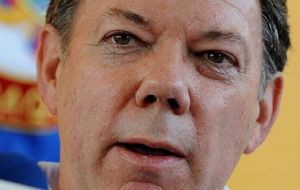MercoPress. South Atlantic News Agency
War on drugs has failed and requires new radical reform, says LSE report
 Time for a fresh look, outside the box, said President Santos in his foreword to the report
Time for a fresh look, outside the box, said President Santos in his foreword to the report The global war on drugs has failed and international policy requires radical reform to remove outmoded, unscientific thinking, according to a major new report from the London School of Economics and Political Science which has been endorsed by President Santos of Colombia.
It explores the “overwhelming” empirical data showing that the current system has failed. It argues that the human cost of pursuing many international policies renders them unjustifiable – from mass incarceration in the US and Asia, to the HIV/AIDS epidemic in Russia, and violence dominating Latin America.
The Global Drug Wars, published by LSE’s IDEAS centre for the study of international affairs, says that the failure of the global war on drugs is no longer a point of controversy, yet the UN and key governments continue to pursue ineffective policies “driven by a mixture of bureaucratic and ideological inertia.”
It examines how the complex and opaque international drug control system evolved and why it continues to operate in the manner that it does. The reasons why some drugs have traditionally been the subjects of ‘war’, while others have become deeply ingrained in the mainstream economy are also explored. James Mills of the University of Strathclyde surveys the “questionable scientific evidence” which underpins cannabis being a controlled drug.
Examining the war against cocaine in Latin America, Paul Gootenberg of the State University of New York at Stony Brook, argues that international drug policy makers create larger and more violent problems than their policies resolve.
Former Swiss President, Ruth Dreifuss, evaluates Switzerland’s interaction with the international system, highlighting the pressure exerted on states trying to pursue policies outside the norm.
Other experts focus on human rights abuses, such as long incarceration for minor drugs offences and lack of treatment for addicts. The International Narcotics Control Board is also criticised for its support for unscientific policies and its refusal to endorse best practice public health policies, particularly around HIV/AIDS prevention. The INCB is branded “the most closed and least transparent of any entity supported by the UN.”
President Santos, in his foreword to the report, says: “The time has come to take a fresh look and we invite world leaders, scientists and experts to start an open, serious and honest debate about this war. The time has come to think outside the box.”
He adds: “This report is a valuable contribution to this healthy and necessary debate. By re-examining the international approach to the drug problem from an academic perspective, we are nourishing the discussion and setting the conditions to find a new and more efficient strategy.”
The report is written by leading experts from universities and other organisations around the world.




Top Comments
Disclaimer & comment rules-

-

-

Read all commentsGovernments barely ever won a battle in the war on drugs. It's utterly crazy where we've ended up. It's a multi billion dollar industry, one of the largest in the world - and they choose to fight it rather than tax it.
Oct 25th, 2012 - 11:46 am 0They'd be much better off letting the likes of Glaxo develop recreational drugs rather than some dodgey blokes in a hut in Columbia.
People want drugs. Banning it will never stop people wanting drugs. All it does is change the supply chain.
Funny article. Of course the LSE says the war on drugs has failed. First question to be asked is: How many of the drugs are used by the LSE? Where else should we look? Limp-wristed liberals? As well as, in the UK, limp-wristed Liberal Democrats. Then there's the “human rights” numpties. Here's a thought. Do drug traffickers have “human” rights? Should they? If someone doesn't have a problem damaging, or killing, you or your kids, what “rights” would you let them have? Having been there, stop tying the hands of enforcement agencies. Let's suppose the basic penalty for drug trafficking was execution within 30 days. Ever seen a film of what drugs can do to someone? I saw a film of an autopsy on a 22-year old (female) addict. She looked about 80. This you want to tax? How do you feel about taxing murder? My reaction to drug dealers and traffickers is that the first thing I would do is to blow their kneecaps off. Just to make sure they didn't run away. Then I'd shoot them up with their own “products”. Every couple of hours. By the time it got to “execution day”, they'd be begging for it.
Oct 25th, 2012 - 02:45 pm 0conqueror
Oct 25th, 2012 - 02:53 pm 0I don't fully agree with your methods, but I will support you in your quest.
Start in Colombia, the biggest drug traffickers in SA have 7 military bases there...
Commenting for this story is now closed.
If you have a Facebook account, become a fan and comment on our Facebook Page!